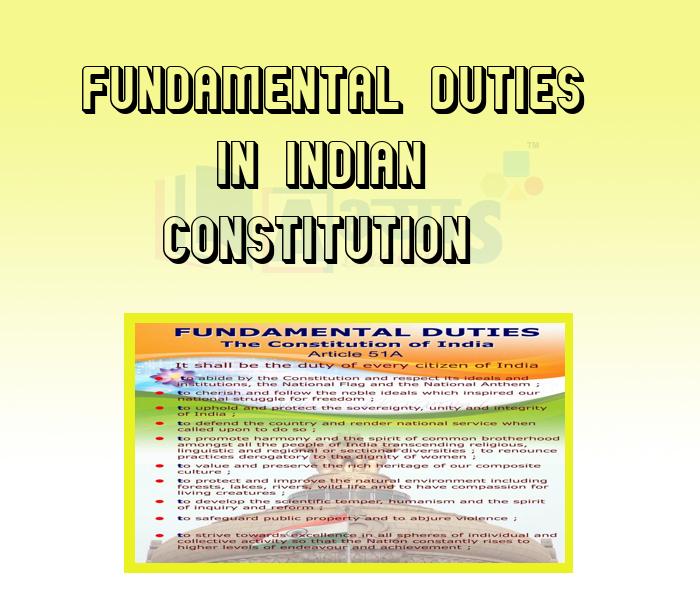Fundamental Duties In Indian Constitution










Fundamental Duties In Indian Constitution
Fundamental Duties:
By the 42nd Amendment of the Constitution, adopted in 1976, Fundamental Duties of the citizens have also been enumerated. Article 51 'A', contained in Part IV A of the Constitution deals with Fundamental Duties. These enjoin upon a citizen among other things, to abide by the Constitution, to cherish and follow noble ideals, which inspired India's struggle for freedom, to defend the country and render national service when called upon to do so, and to promote harmony and spirit of common brotherhood transcending religious, linguistic and regional or sectional diversities.
Fundamental Duties of citizens serve a useful purpose. In particular, no democratic polity can ever succeed where the citizens are not willing to be active participants in the process of governance by assuming responsibilities and discharging citizenship duties and coming forward to give their best to the country. Some of the fundamental duties enshrined in article 51A have been incorporated in separate laws.
"Preserve the sovereignty, unity and integrity of India and keep it intact." This provision is contained in ___________________________ | |||
| Right Option : D | |||
| View Explanation | |||
Fill up : 'Rights ______ duties.' [SSC CPO 2014] | |||
| Right Option : C | |||
| View Explanation | |||
Which of the following are correct : (a) The system of Fundamental Duties in the Indian Constitution is derived from the Constitution of the former Soviet Union. (b) According to Article 51 (a) of the Indian Constitution every citizen has to perform the Fundamental duties. | |||
| Right Option : C | |||
| View Explanation | |||
Students / Parents Reviews [10]
It was a good experience with Abhyas Academy. I even faced problems in starting but slowly and steadily overcomed. Especially reasoning classes helped me a lot.

Cheshta
10thAbhyas Methodology is very good. It is based on according to student and each child manages accordingly to its properly. Methodology has improved the abilities of students to shine them in future.

Manish Kumar
10thAbhyas is a complete education Institute. Here extreme care is taken by teacher with the help of regular exam. Extra classes also conducted by the institute, if the student is weak.

Om Umang
10thMy experience with Abhyas is very good. I have learnt many things here like vedic maths and reasoning also. Teachers here first take our doubts and then there are assignments to verify our weak points.

Shivam Rana
7thOne of the best institutes to develope a child interest in studies.Provides SST and English knowledge also unlike other institutes. Teachers are co operative and friendly online tests andPPT develope practical knowledge also.

Aman Kumar Shrivastava
10thIt was good as the experience because as we had come here we had been improved in a such envirnment created here.Extra is taught which is beneficial for future.

Eshan Arora
8thI have spent a wonderful time in Abhyas academy. It has made my reasoning more apt, English more stronger and Maths an interesting subject for me. It has given me a habbit of self studying

Yatharthi Sharma
10thMy experience with Abhyas academy is very good. I did not think that my every subject coming here will be so strong. The main thing is that the online tests had made me learn here more things.

Hiya Gupta
8thIt has a great methodology. Students here can get analysis to their test quickly.We can learn easily through PPTs and the testing methods are good. We know that where we have to practice

Barkha Arora
10thAbout Abhyas metholodology the teachers are very nice and hardworking toward students.The Centre Head Mrs Anu Sethi is also a brilliant teacher.Abhyas has taught me how to overcome problems and has always taken my doubts and suppoeted me.
